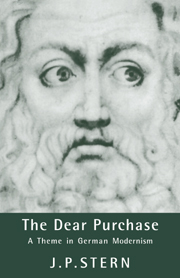Foreword by Nicholas Boyle
Published online by Cambridge University Press: 04 December 2009
Summary
The Dear Purchase is Peter Stern's last completed book, and also the book he spent most of his academic life writing. It is a critical study of German literature (especially fiction, poetry and nonprofessional philosophy) from Nietzsche to the death of Thomas Mann. That literature is seen as marked above all by a metaphysical and moral intensity named by Stern in the phrase which gives the book its title and which derives from a sonnet by the seventeenth-century poet Andreas Gryphius, quoted in Chapter I. There are also overtones of the story of Faust. Stern argues that this theme is ubiquitous in German literature of the first half of the twentieth century, and must be accounted either a partial cause, or at least a major symptom, of Germany's readiness in those years to plunge itself and the world into disaster. It is a study which he alone was qualified to write, and it was completed only just in time. He conceived it, as he tells us in his introduction, in 1957, and first published an outline of its argument in an article in German Quarterly in 1968. After several preliminary studies, which also turned into books, he seems to have begun drafting around 1972. The book became his principal, but not even then his only, concern when he retired from his Chair at University College, London, in 1986. He pronounced it finished, from the bed in which he was to die a few days later, in November 1991.
During that final illness he was also correcting the proofs of another book, The Heart of Europe, which brought together numerous published but previously uncollected essays.
- Type
- Chapter
- Information
- The Dear PurchaseA Theme in German Modernism, pp. xi - xxPublisher: Cambridge University PressPrint publication year: 1995



